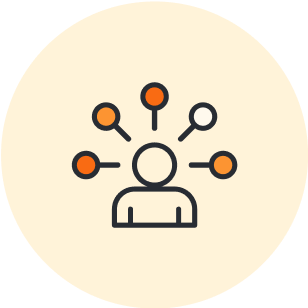New sales reps are the lifeblood of any growing sales organization. Not only do they increase your capacity to reach and attract more customers, new sales reps often bring fresh insights and different perspectives that may prove helpful to achieving your most ambitious sales goals.
Taking time to set new sales reps up for success from the start should always be a top priority, since successfully onboarding and training your sales reps does more than improve sales numbers. It can help your organization avoid the expense of missed revenue and unrealized productivity.
Research by a leading career firm shows that companies offering a great onboarding experience can increase retention by 82%. According to Katherine Graham-Leviss, author of The Perfect Hire: A Tactical Guide to Hiring, Developing, And Retaining Top Sales Talent, a conservative estimate for the cost to any sales organization of 100 employees with a 10% annual rate of turnover totals $750,000.
Fortunately, your sales organization can work to avoid such costly employee turnover in a way that also improves overall customer satisfaction. It may surprise you, but one of the most overlooked aspects of the sales training and onboarding process is also the one that should be considered most critical: product training.
As a sales leader, are you allocating enough time and resources to your organization’s product training efforts? How could a renewed focus on product training transform your organization?
The following are three lasting benefits your sales organization may begin to realize simply by incorporating a more in-depth approach to product training for its newest sales reps.
Product training for sales reps allows them to understand customer pain points
Your sales organization’s long-term success and very existence depend on its unique ability to address the pain points of its customers. Your newest sales reps share this responsibility.
With in-depth product knowledge, new sales reps are better equipped to explain how and why your organization's service alleviates common pain points. It can also help them decide which of your offerings is most suitable for each particular prospect.
Author and speaker Kary Oberbrunner suggests there are six steps involving customer pain points that influence every purchase decision: pain, proof, picture, process, people, and purpose.
The first three steps involve getting the customer aligned with the pain point. The last three help identify your product as the solution to their pain. Of course, no product will resolve all of every customer’s pain points. The key is for new sales reps to be able to discern which product will best satisfy the need your customers feel is the most important at the time.
In some instances, this could mean foregoing certain pain points in favor of addressing others. Or knowing when to favor price over quality or convenience in lieu of value to secure a sale.
Luckily, Lucidchart offers a quick, effective, and intuitive way for sales reps to visually outline their customer’s unique pain points while precisely conveying the distinct advantages of your product or service. Sales leaders can use templates to build out sales processes and dashboards for new sales reps to use in the field or on the phone—helping ensure a consistent approach to sales across the organization.
New sales reps can also share a view-only version of the diagram to walk prospects through the sales process and different buying scenarios while positioning your product as the best solution.
Product training for sales reps builds confidence in their sales abilities
Whether your organization deals in luxury consumer goods, lifesaving pharmaceutical solutions, financial investment opportunities, or anything else, customers look to your sales reps as their best source of product knowledge—regardless if they’re a novice or seasoned veteran.
Product knowledge is more than an essential sales skill. For sales reps of all experience levels, it becomes a source of confidence. Additionally, being known for having a knowledgeable sales staff will differentiate your organization from the competition and drive continual sales growth.
Customers gravitate to sales reps who are enthusiastic about the products they sell and keen to elaborate on the benefits with them. Being able to explain a product’s virtues both passionately and accurately naturally leads to added confidence and skill in each successive sales encounter.
Sales objections are nothing more than questions. When a sales prospect objects, it may simply be a matter of needing more product knowledge. With proper product training, your new sales reps will quickly become more comfortable in making sales presentations and closing deals.
Knowledge is a source of power. One that should be shared across your sales organization.
Product training for sales reps allows them to provide a superior buying experience
For a new sales rep, customer concerns or objections regarding price can feel insurmountable.
But naturally, seasoned sales professionals see things a little differently. And for good reason.
When a prospect is deciding whether or not to buy, it’s their perception of the overall buying experience that often outweighs the price and the product itself. What customers really care about most is the benefit they get from buying and the return that comes from making the purchase.
As Roger L. Martin, author and director of the Martin Prosperity Institute, observed in his article for the Harvard Business Review, people are often willing to pay a super-high price premium for vacation properties in Aspen or Park Avenue, buy Hermes bags or other ultra-expensive luxury fashion items on a whim, or spend in excess of $250K for an ultra-exclusive car brand.
But why? The answer is all about identity.
This phenomenon isn't restricted to the impulsive spending habits of the wealthy. According to Martin’s research, buying goods “both helps you reinforce to yourself who you are, and encourages others to come to the same conclusion about you.” For loyalists of The New Yorker, it’s why paying a higher subscription rate seems to provide a better buying experience.
Not every buying experience revolves around price. Steve Jobs employed his “intention first, implementation second” attitude when modeling Apple’s Genius Bar after the legendary concierge station of the Ritz-Carlton—complete with an empathetic, knowledgeable sales staff.
According to a Salesforce study, 57% of customers have stopped buying from a company because a competitor provided a better experience. 76% of customers also reported that it’s now easier than ever to take their business elsewhere—switching from brand to brand to find an experience that matches their expectations. And by 2020, 75% of business buyers expect companies to anticipate their needs and make relevant suggestions before they initiate contact.
Delivering a great experience may have the biggest impact on whether or not potential customers purchase from you. And you can only deliver a great experience when your sales reps are knowledgeable about your product.
Increase sales product training with Lucidchart
Set your sales team up for success with Lucidchart. Easily visualize and implement processes across your entire sales team to close bigger deals faster. Here's how you can use Lucidchart to better equip your sales reps more effectively:
- Lucidchart can help you visualize the difference between the company’s process with and without your product using a current vs. future state flowchart. These diagrams will allow reps to practice giving demos.
- Create centralized documentation so reps can refer back to the use cases and principles you train them on. It’s important to remember that giving reps the opportunity to reinforce what they’ve learned is a vital part of the ramping process.
- Show new reps account maps from previous deals. Walk them through what pain points the customer had, what benefits they were looking for, and the internal relationships that were at play before they purchased your product.

See what an effective onboarding process looks like for your sales reps.
Learn moreAbout Lucidchart
Lucidchart, a cloud-based intelligent diagramming application, is a core component of Lucid Software's Visual Collaboration Suite. This intuitive, cloud-based solution empowers teams to collaborate in real-time to build flowcharts, mockups, UML diagrams, customer journey maps, and more. Lucidchart propels teams forward to build the future faster. Lucid is proud to serve top businesses around the world, including customers such as Google, GE, and NBC Universal, and 99% of the Fortune 500. Lucid partners with industry leaders, including Google, Atlassian, and Microsoft. Since its founding, Lucid has received numerous awards for its products, business, and workplace culture. For more information, visit lucidchart.com.
Related articles
How to determine ramp-up time for sales reps
Streamline the ramp-up process for new hires. This blog breaks down a few methods for measuring ramp-up time and provides actionable tips for improving your sales onboarding processes.
Account mapping: A win-win for sales leaders and sales reps
Learn why account mapping is a win for everyone—leadership knows reps are executing, and reps are confident because they are. Our VP of Inside Sales, Peter Chun, shares the benefits of account mapping and the impact this practice has had on our sales org.
3 Ways to Improve Your Team’s Onboarding Materials with Lucidchart
Think back to your first day at your current job. You were likely overwhelmed—with paperwork, with company-specific jargon, with new faces, with a different office space. As a manager, you can alleviate some of this first-day anxiety by providing your new employees the proper materials for your team. You have seen how Lucidchart can improve your work processes, but it can also orient new hires to the office before their work even begins.
A quick and easy guide for onboarding remote employees
Onboarding is one of the most important processes to make your remote employees feel welcome and ready to work, even outside of a traditional office. See our tips for onboarding remote employees.
Bring your bright ideas to life.
By registering, you agree to our Terms of Service and you acknowledge that you have read and understand our Privacy Policy.
